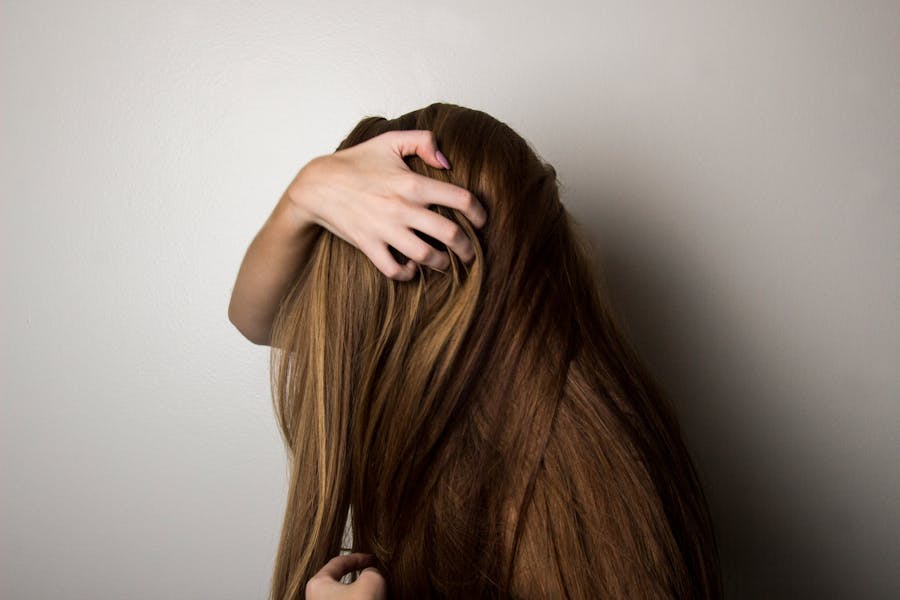Your journey to optimum health can sometimes be perplexing. They may make changes for the better, only to be confused or derailed by something else coming up. Sometimes, it’s hard to know if this new issue is part of the process or is something to be genuinely concerned about.
One of the issues that can come up during a detox and parasite cleansing is hair loss, also called alopecia. (1)
It doesn’t happen to everyone during detox. But if it does, it can leave you wondering if they are on the right track. They may wonder why it’s happening, if it’s normal, and how long it will last.
The Hair Cycle
All of the hair follicles are developed by week 22 in the womb. Just like cycles in seasons, hair growth has cycles as well. There are three stages: (2)
- The anagen phase, or growth stage. This is when hair grows most rapidly. 80-90% of hair is at this stage most of the time.
- The catagen phase, or the degrading stage. Hair isn’t performing rapid cell division like before because it has stopped growing. It’s almost like a holding phase. 1-2% of your hair is at this stage most of the time.
- The telogen phase, or resting stage. A new hair is produced under the presently existing hair, and the existing hair strand is shed to make way for the new one. 10-20% of hair is in this “ready to be shed” stage most of the time.
Besides these individual growth cycles, hair truly does cycle with the seasons. Because the levels of neurotransmitters vary with changes in light and temperature, animals shed more in spring and fall to get a different thickness of coat to correspond with the seasons. Humans can even shed more hair during the spring or fall months as well. (2)
Normal Hair Loss
Hair loss in some amounts is part of everyday life and fluctuates person to person. It doesn’t matter the age. In fact, 3% of all visits to the pediatrician are because of childhood hair loss. (3)
According to the American Academy of Dermatology Association, it is perfectly normal for someone to lose between 50 and 100 hairs per day. Going from 50 to 100 can seem serious, but there is a difference between excess shedding and actual hair loss. (4)
Causes of Hair Loss or Increased Hair Shedding
The hair is very sensitive to what is going on in the rest of the body. It can be a sign that things are out of balance and need to be addressed. While there are different types of hair loss, it’s more of a symptom of other possible health issues.
Factors that can contribute to hair loss are:
- Heavy metal toxicity (5)
- Nutritional deficiencies (6)
- Stress (7)
- Thyroid issues (hyper and hypothyroid, and autoimmune issues can cause hair loss) (8)
All four of these problems play off each other and increase the effects of the others. But parasites can be the crux of these issues, hence why ridding the body of parasites via a cleanse or detox may help.
If patients are going through a parasite cleanse or detox, hair loss can also be part of this healing process. It may be frustrating for your patients, but it doesn’t necessarily mean they are on the wrong path.
Before a parasite cleanse, the parasites in the body have been creating deficiencies, increasing inflammation, and releasing toxins, unbeknownst to the host. However, during a detox and parasite cleanse, these problems can rise to the surface. And one of these things can be hair loss.
The good news is once the sources of the hair loss are taken care of, the hair usually grows back.
Hair loss in some amounts is part of everyday life and fluctuates person to person. It doesn’t matter your age. In fact, 3% of all visits to the pediatrician are because of childhood hair loss. (2) It is perfectly normal for you to lose between 50 and 100 hairs per day. Going from 50 to 100 can seem serious, but there is a difference between excess shedding and actual hair loss.
Causes of Hair Loss or Increased Hair Shedding
The hair is very sensitive to what is going on in the rest of the body. It can be a sign that things are out of balance and need to be addressed. While there are different types of hair loss, it’s more of a symptom of other possible health issues.
Factors that can contribute to hair loss are:
- Heavy metal toxicity (5)
- Nutritional deficiencies (6)
- Stress (7)
- Thyroid issues (hyper and hypothyroid, and autoimmune issues can cause hair loss) (8)
All four of these problems play off each other and increase the effects of the others. But parasites can be the crux of these issues, hence why ridding the body of parasites via a cleanse or detox may help.
If patients are going through a parasite cleanse or detox, hair loss can also be part of this healing process. It may be frustrating for your patients, but it doesn’t necessarily mean they are on the wrong path.
Before a parasite cleanse, the parasites in the body have been creating deficiencies, increasing inflammation, and releasing toxins, unbeknownst to the host. However, during a detox and parasite cleanse, these problems can rise to the surface. And one of these things can be hair loss.
The good news is once the sources of the hair loss are taken care of, the hair usually grows back.
1. Heavy Metals and Hair Loss
Heavy metals in the wrong dose, form, and oxidation state can cause heavy metal toxicity in the body and create hair loss, rather than hair growth. The toxic forms shorten the hair cycle instead of lengthening it. Remember, the human body needs the right bioavailable forms from plants that the body can utilize and to detox the forms that are creating the toxicity. (9, 10, 11)
Toxic forms of heavy metals interfere with the proteins in hair formation by preventing them from bonding with each other properly. Not only do heavy metals contribute to hair loss, but the hair that does form will be weak and easily broken. Because toxic heavy metals create ROS or reactive oxygen species, they damage DNA and mitochondria and interfere with hair pigment, even turning it gray. (12, 13)
Heavy metals also interfere with hormones and thyroid function and like to accumulate in the thyroid as well. This is especially true of cadmium. (14)
Parasites are a sponge for heavy metals. So when it comes to a heavy metal detox, it’s important to remember to do it in the right order. Detoxing heavy metals from tissues immediately won’t be the best strategy in the long run. The parasites will spew toxic heavy metals right back out, poisoning the body again. (15)
After making sure all the drainage pathways are open, have patients do a parasite cleanse first and then detox from the heavy metals still lingering. This will help them get rid of the heavy metals interfering with their hair growth.
For a heavy metal detox, consider using a binder that will not only rid the body of the toxicity, but will also aid in the replenishing of tissues and nutrients.
2. Nutritional Deficiencies
Having proper nutrition is essential for healthy hair growth. Parasites not only rob the body of nutrients, but they also change and reduce the amount of enzymes in the digestive tract. They can even change their environment to suit them, which ultimately hurts the body. Parasites also prevent the body from properly absorbing and digesting food, which can leave the body deficient in the building blocks needed for healthy hair. (20)
Parasites and other pathogens protect themselves via the body’s biofilm. This complex process of biofilm formation is made out of: (21)
- Enzymes
- DNA and RNA
- Polysaccharides
- Protein
Hair is 65-95% protein. If parasites and other pathogens use the body’s protein to survive, hair health is bound to suffer. (22, 23)
Along with taking macronutrients, parasites leach micronutrients as well. Because these are also heavy metals, it’s important to get these metals in the right form for health:
- Copper — affects thyroid hormones, increases genetic growth factors, and helps lengthen the time each hair is kept on the head (24, 25)
- Iron — essential for thyroid function, important during an infection (parasites will battle host body for iron), and required for hair growth and red blood cells (26)
- Zinc — relates to healthy thyroid function, slows the progression of hair getting to the shedding stage, and speeds up hair follicles recovery after hair falls out (27, 28)
3. Stress and Hair Loss
Emotional stressors can also influence the hair cycle. When under chronic stress, the body produces high levels of cortisol to cope with any “threats.” (29)
A short burst of stress is not a big deal. That is what cortisol is designed for. But our modern lives aren’t one little burst of stress with lots of peace in between. Chronic stress has the adrenals pumping out cortisol constantly.
Combine that with the physical and chemical stressors your patients may be dealing with, and their hair can start to really suffer. High cortisol reduces the ability to produce hair and speeds up shedding by 40% while also suppressing thyroid hormones. (30)
While easier said than done, remind patients to take the time to reduce stress levels, as it can be a factor for hair loss.
4. Thyroid and Hair Loss
When it comes to hair loss, all paths seem to lead to the thyroid. Along with heavy metals, nutritional deficiencies, and stress, there are more additional ways the thyroid could be irritated and cause hair loss.
Bacteria and viruses
These types of pathogens can lead to an immense amount of stress on the thyroid and provoke hair loss. For instance, the Epstein-Barr virus can cause the thyroid to develop autoimmune antibodies. It can also mimic white blood cells and affect how well they perform and change the responsiveness of the immune system. (31)
As a bacteria, Lyme disease causes huge stress on the body. Lyme can lead to hypothyroidism, which can also cause your patients to lose their hair. If this is the case, once you help treat the Lyme bacteria, hair loss is reversed. (32, 33)
Gluten molecular mimicry
As you know, the body constantly tries to protect itself from threats, including the foods that have been ingested. Some protein molecules in food can be incredibly similar to body tissues in their shape. The body may see that food as a threat and create antibodies, such as the case with a gluten allergy. (34)
Unfortunately, because of how similar these molecules are, the body can make mistakes. A cross-reaction can happen, where the body mistakes gluten molecules for a thyroid tissue. This can cause the body to create autoimmune-type antibodies and disrupt the thyroid function, which can result in hair loss. (35)
The best way to overcome this is by removing the offending food from the affected individual’s diet. That will ease the stress on their thyroid and help prevent the “molecular confusion.” (36)
Parasites
Of course, parasites can interfere with the thyroid without your patient knowing about it. It’s possible for them to not have signs of a thyroid issue, but for the parasites to still cause thyroid inflammation. (37)
The parasites might not be directly in the thyroid. In fact, most of the time they aren’t. But their presence in the body can rile up the immune system, creating antibodies. These antibodies usually calm down over time once the “threat” (parasites) has been removed. (37)
Just like with heavy metals, another factor affecting the thyroid is the many toxins parasites release into the body. They may be residing in the digestive tract, far from the thyroid, but their toxins irritate the whole body and can cause hair loss. (38)
All in all, detoxing and engaging in a parasite cleanse can help your patients ease the pressure off the thyroid. Their body will be able to function better, so their hair has a chance to grow back.
Temporary Hair Loss for Health Gains
Sudden hair loss during a detox protocol will most likely be temporary. Once patients rid themselves of the sources stressing their body, their hair will have the opportunity to grow back.
A parasite cleanse will help support their body in the removal of heavy metals and toxins. It will also help your patients pass these parasites so they don’t absorb the nutrition needed for healthy hair.
Remind your patients that hair loss is the alarm that something is wrong; it’s not the fire. Losing hair due to high stress means it’s time for them to practice self-care. It’s time to detox not only their body, but detox their life from too much stressful activity and not enough rest.
Hair loss might be a bump on their path to wellness. But the long-term health benefits they will gain from uncovering and removing the hidden sources will be worth it.







